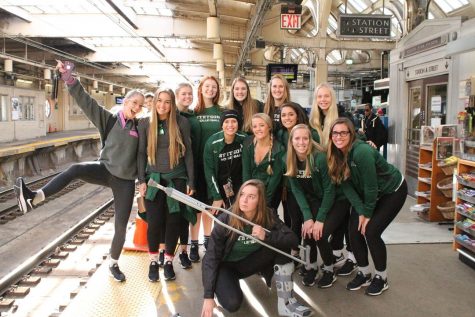On the Road Again
February 6, 2017
Traveling for an away game can be great. It gives athletes a chance to see other universities while breaking up the monotony of training and competing at home. Long bus rides can host the most meaningful team bonding experiences.
Some coaches go out of their way to try to let their athletes see more than their sports arena and hotel rooms, a limitation that is often the case. My teammates on the Indoor Volleyball team and I were able to spend a few hours in New York City before competing in a conference match against NJIT the following day. A few years ago, Stetson’s football players dined with alumni in Chicago the weekend of their game against Valparaiso.

Of course, some sports are on the road much more often than others. According to a 2015 study done by the NCAA, a typical student athlete is away from campus at least 1.5 days out of the week, with some sports absent even more: Division I women’s golf and DI softball (2.7 days), DI women’s volleyball and DI baseball (2.6 days), and DI men’s golf and DI women’s soccer (2.3 days). All this time spent away comes at a cost for student athletes.
While some might think missing class is a luxury, professors are not mandated to allow student athletes to make up their assignments or time missed. Luckily, Stetson’s small community means that professors are usually willing to work with student athletes. However, a few student athletes here at Stetson have discovered how detrimental traveling can be for their grades.
Senior soccer player Jared Huber and his student athlete peers faced strict penalties in their Zombie Apocalypse Junior Seminar last semester. Huber commented, “Unfortunately traveling has put me in tough situations where I have to accept a negative factor on my grades or choose to not help my teammates get a conference win.”
Within the first week or so of their season, all Stetson student athletes are required to get paperwork signed stating that they have given their professors competition schedules and notified them of the days that they will miss class. Student athletes are also told that it is their responsibility to continue communications regarding missed classes throughout the semester.
As an in-season athlete, playing two games a weekend, missing the majority of Thursday afternoon and Friday classes is unavoidable. The 2015 study detailed that DI women’s athletes miss at least 2 classes per week during their season. DI men’s athletes missed between 1.3-2.2 classes per week in season, depending on their sport.
Many student athletes understand from the get-go that this is a negative side effect of playing collegiate level sports. An article from the NCAA authored by Greg Johnson describes that missing class comes with the atmosphere. From a panel on how to deal with the absences, Johnson writes, “The most important factor was for student-athletes to stay engaged with the faculty to develop a good working relationship so that the student-athlete maintains academic success without compromising faculty expectations.” I agree with Johnson to the extent that this has mostly been my experience with travel for my sport; but, what can athletes like Huber do if a professor just refuses to work with them?






